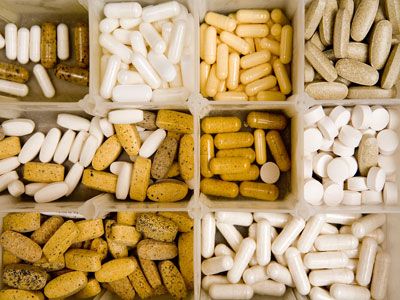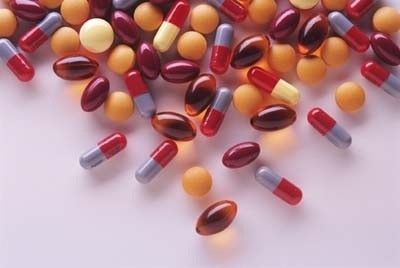A full day's supply of vitamin C! A full day's supply of 12 vitamins and minerals! A single glass of vitamin-D-fortified milk sending half a day's recommended dose of the vitamin coursing through your body!
It's very exciting, all this vitamin-y goodness. Vitamins, which are organic substances found in plant and animal sources, help our bodies function properly. They're crucial to the activities of our cells, our organs, immune systems and general energy supply. They may even help ward off cancer.
Advertisement
What exactly does that mean, though, to consume vitamins? What happens when we swallow foods containing vitamin molecules? How do we absorb them in order to reap their healthful effects?
Well, that depends on the type of vitamin we're talking about. There are two kinds: fat-soluble and water-soluble.
In terms of overall digestion, what's going on is pretty standardized. The digestive tract starts at the mouth; there, we chew food and drench it in saliva to begin the process of breaking it down into pieces small enough for our bodies to absorb. That food moves through the esophagus into the stomach, where molecules of carbohydrates, fats, proteins, vitamins and other nutrients are further broken down, usually by stomach acids. The nutrients then move to the small intestine, the large intestine (colon), the rectum, and finally the anus, from which the remaining, non-nutritional matter is expelled.
The small intestine is where vitamin absorption happens (along with most other types of absorption). Water-soluble vitamins, such as vitamin C, have "active transports" for absorption -- molecules that pick them up in the small intestine, in a section called the jejunum, which is located about midway through. These transports carry the vitamin molecules through the intestine's cell walls and deposit them in the body, where they can enter the bloodstream. Because they dissolve in water, they don't require stomach acids to enable absorption; this also means they leave the body every day in your urine, so you need to consume these vitamins every day in order to maintain a full supply.
The B vitamins are also water-soluble and need to be replenished every day, although their absorption works a bit differently. They're bound to proteins and therefore require a protein breakdown triggered by stomach acids. Absorption of most of the B vitamins happens further down in the small intestine, in the ileum.
The other type of vitamin, the fat-soluble ones such as A, D, E and K, need to dissolve in fat before they can make it into the body. The process requires fat-digesting bile acids that come from the liver and live in the small intestine. When the bile acids break down the fat the vitamins are dissolved in, the vitamins move with the fat through the intestinal wall, into the body, and finally end up in the liver and in body fat, where they're stored until they're needed (much like fat).
Fat-soluble vitamins, therefore, don't require daily consumption. They stick around inside the body.
One downside of storable vitamins is that they can build up in your system, so it's important to make sure you don't overdo it. In other words, be careful with supplements containing fat-soluble vitamins.
Water-soluble vitamins, on the other hand, tend more toward the deficiency side, since they can't be effectively stored. So remember to drink your O.J. and eat your B-heavy fish, poultry, eggs or fortified bread. You'll run out of energy (among other things) without it.
For more information on vitamin absorption and related topics, look over the links on the next page.
Advertisement


